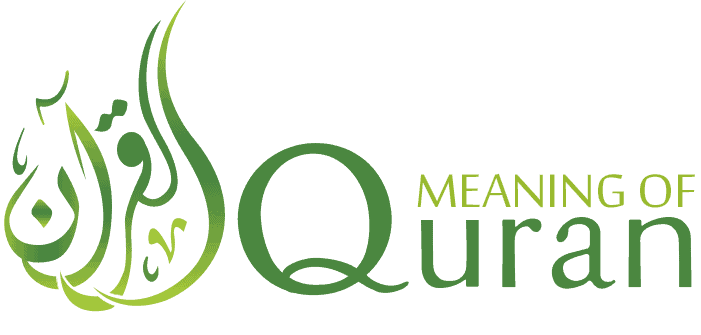Ad-Duhaa | The Morning Hours
With the name of Allah, the All-Merciful, the Very-Merciful.
[93:1] I swear by the forenoon,
[93:2] and by the night when it becomes peaceful,
[93:3] your Lord (O Prophet,) has neither forsaken you nor has become displeased.
[93:4] Surely the Hereafter is much better for you than the present life.
[93:5] And of course, your Lord will give you so much that you will be pleased.
[93:6] Did He not find you an orphan, and give you shelter?
[93:7] And He found you unaware of the way (the Shariah), then He guided you.
[93:8] and He found you in need, then made you need-free.
[93:9] Therefore, as for orphan, do not oppress him,
[93:10] and as for the beggar, do not scold him.
[93:11] And about the bounty of your Lord, do talk.
With the name of Allah, the All-Merciful, the Very-Merciful.
[93:1] I swear by the forenoon,
[93:2] and by the night when it becomes peaceful,
[93:3] your Lord (O Prophet,) has neither forsaken you nor has become displeased.
[93:4] Surely the Hereafter is much better for you than the present life.
[93:5] And of course, your Lord will give you so much that you will be pleased.
[93:6] Did He not find you an orphan, and give you shelter?
[93:7] And He found you unaware of the way (the Shariah), then He guided you.
[93:8] and He found you in need, then made you need-free.
[93:9] Therefore, as for orphan, do not oppress him,
[93:10] and as for the beggar, do not scold him.
[93:11] And about the bounty of your Lord, do talk.
Tafsir
Overview of Surah Ad-Duhaa
- Title and Position: Surah Ad-Duhaa is the 93rd chapter of the Quran. The title “Ad-Duhaa” translates to “The Morning Brightness” or “The Forenoon,” referring to the bright morning light, which is used as an oath in the surah to offer comfort and reassurance to the Prophet Muhammad.
- Verses and Structure: This surah contains 11 verses. It is known for addressing the Prophet’s distress during a period when revelations were temporarily suspended, reassuring him of God’s favor and guidance.
- Themes and Messages: Major themes include the reassurance of divine support, the blessings bestowed upon the Prophet, the encouragement to care for the needy, and the affirmation of the afterlife and God’s ultimate justice.
- Significance in Islamic Thought: Surah Ad-Duhaa is significant for its comforting and encouraging tone, emphasizing God’s care and guidance for the Prophet and, by extension, for all believers, underscoring the importance of trust in God and compassion towards others.
Detailed Explanation
- Divine Oaths and Reassurance: The surah opens with oaths by the morning brightness and the night, symbolizing light after darkness, reflecting the message of hope and continuity of divine guidance to the Prophet.
- Blessings to the Prophet: It recounts the blessings conferred upon the Prophet Muhammad, reminding him of God’s care throughout his life, from his orphaned childhood to the bestowal of prophethood.
- Call to Righteousness: The surah encourages the Prophet to continue his mission with kindness and compassion, especially towards the less fortunate, emphasizing that the path of righteousness is marked by care and service to others.
- Affirmation of the Hereafter: It concludes with a reminder of the life to come, where ultimate happiness and satisfaction will be attained, contrasting the transient nature of worldly troubles.
- Message of Hope and Gratitude: Ad-Duhaa serves as a message of hope and encouragement, urging the Prophet—and by extension, all believers—to remain steadfast, grateful, and compassionate, trusting in God’s wisdom and mercy.
FAQs
- Why is Surah Ad-Duhaa named “The Forenoon”?
- The surah is named “Ad-Duhaa” due to its reference to the morning brightness, symbolizing light, guidance, and hope, reflecting the surah’s overarching theme of reassurance and divine favor.
- What is the historical context of Surah Ad-Duhaa?
- The surah was revealed during a time when the Prophet Muhammad experienced a pause in revelation, causing him distress. This surah was revealed to comfort him and reaffirm God’s support and the continuation of his prophetic mission.
- How does Surah Ad-Duhaa address the Prophet’s concerns?
- It addresses his concerns by reminding him of God’s past favors, asserting ongoing support, and encouraging him to remain engaged in acts of kindness and remembrance of God’s blessings.
- What lessons can believers derive from Surah Ad-Duhaa?
- Believers can derive lessons of hope, gratitude, patience, and the importance of compassion and charitable actions, emphasizing trust in God’s plan and the value of perseverance through challenging times.
- The surah is named “Ad-Duhaa” due to its reference to the morning brightness, symbolizing light, guidance, and hope, reflecting the surah’s overarching theme of reassurance and divine favor.
- The surah was revealed during a time when the Prophet Muhammad experienced a pause in revelation, causing him distress. This surah was revealed to comfort him and reaffirm God’s support and the continuation of his prophetic mission.
- It addresses his concerns by reminding him of God’s past favors, asserting ongoing support, and encouraging him to remain engaged in acts of kindness and remembrance of God’s blessings.
- Believers can derive lessons of hope, gratitude, patience, and the importance of compassion and charitable actions, emphasizing trust in God’s plan and the value of perseverance through challenging times.
Read more
